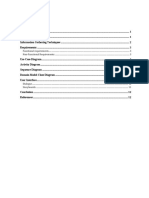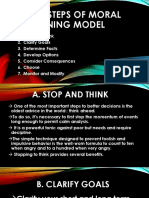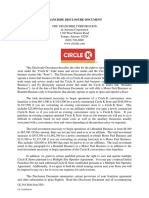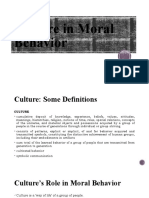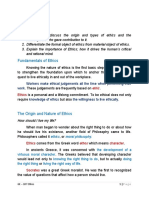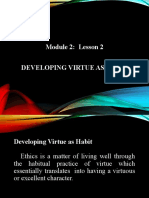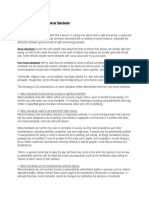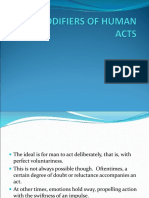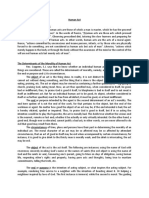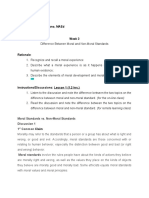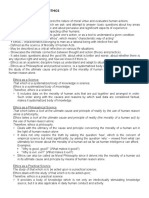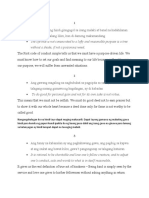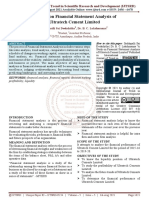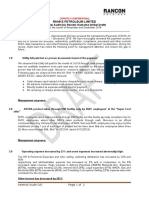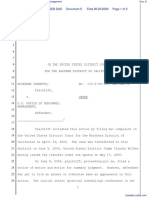Professional Documents
Culture Documents
The Circular Relation of Acts and Character
The Circular Relation of Acts and Character
Uploaded by
Elijah Rod Singueo BetitaOriginal Description:
Copyright
Available Formats
Share this document
Did you find this document useful?
Is this content inappropriate?
Report this DocumentCopyright:
Available Formats
The Circular Relation of Acts and Character
The Circular Relation of Acts and Character
Uploaded by
Elijah Rod Singueo BetitaCopyright:
Available Formats
The Circular Relation of Acts and Character
(Excerpted from De Guzman, J.M., et.al. Ethics, 2018)
Used for class study and reflection purposes only-not for circulation
In the process of moral development, there is the circular relation between acts that build
character and moral character itself. Not all acts help to build moral character, but those acts
which emanate from mortal characters certainly matter in moral development. Hence, there
appears the apparent circular relationship between individual acts and moral character. A
person's actions determine his or her moral character, but moral character itself generates acts
that help in developing either virtue or vice.
This goes to show that moral development should also be understood in the sense of
human flourishing. This flourishing is attained by the habitual practice of moral and intellectual
excellences, or virtues. In the context of developing morality, which also brings about self-
realization and happiness, acting in line with virtues is acting in accordance with reason. Indeed,
philosophers like Aristotle hold that that the function of human being consists in activities which
manifests the best states of his rational aspect, that is, the virtues.
Virtuous traits of character ought to be stable and enduring and are not mere products of
fortune, but of learning, constant practice, and cultivation. But we have to add that virtuous traits
of character are called excellences of the human being because they are the best exercise of
reason, which is the activity characteristic of human beings. In this sense, the Greek moralists
believe, virtuous acts complete or perfect human life.
Nonetheless, The Greek philosophers think that it takes someone of good moral character
to determine with regularity and reliability what individual acts are appropriate and reasonable in
certain situations and that it takes someone of good moral character to decide with regularity and
reliability how and when to secure goods and resources for himself or herself and others. Aristotle
that states that, it is not easy to define in rules which acts deserve moral praise and blame , and
that, these matters require the judgment of the virtuous person, that is, someone with good moral
character.
Questions for Self-Reflection:
• What are the things that you consider as contributory elements to your moral character?
• Considering the circularity of the relationship of acts and moral character, how is moral
character developed?
You might also like
- Colin & John Online Book Store Case StudyDocument13 pagesColin & John Online Book Store Case StudyTop 10 zoneNo ratings yet
- Self, Society, and EnvironmentDocument3 pagesSelf, Society, and EnvironmentFrance JamosmosNo ratings yet
- Man As A Moral AgentDocument3 pagesMan As A Moral AgentXytus100% (1)
- Topic 8 - Seven Steps of Moral Reasoning Model V1Document11 pagesTopic 8 - Seven Steps of Moral Reasoning Model V1Meg Guarin76% (21)
- Overview:: A. Directions: Answer The Given Question Base On Your Existing KnowledgeDocument43 pagesOverview:: A. Directions: Answer The Given Question Base On Your Existing KnowledgeJhope Jung100% (8)
- DOI Unsolicited ProposalsDocument16 pagesDOI Unsolicited ProposalseimalmalikNo ratings yet
- Sourcing Practices of Hugo BossDocument3 pagesSourcing Practices of Hugo BossVasant Kothari100% (1)
- Module 8 - Feelings and Moral Decision MakingDocument7 pagesModule 8 - Feelings and Moral Decision MakingUzumaki Naruto100% (2)
- Moral and Non-Moral StandardsDocument9 pagesMoral and Non-Moral StandardsVictoria AntonetteNo ratings yet
- The Moral Agent: REFERENCES: de Guzman Et - Al. (2018) - Ethics Principles of Ethical Behaviour in Modern SocietyDocument8 pagesThe Moral Agent: REFERENCES: de Guzman Et - Al. (2018) - Ethics Principles of Ethical Behaviour in Modern SocietyGenaro Jr. LimNo ratings yet
- Man As The Moral AgentDocument16 pagesMan As The Moral AgentLouie Peñalba Rabanzo50% (2)
- Lesson Self, Society, and CultureDocument8 pagesLesson Self, Society, and Culturebrice burgos73% (11)
- Judge Dredd - Block WarDocument82 pagesJudge Dredd - Block WarJohn Donovan100% (6)
- Nazi Monetary PolicyDocument5 pagesNazi Monetary Policyapi-268107541No ratings yet
- Circle KDocument491 pagesCircle Kpascal rosasNo ratings yet
- Moral Character and VirtuesDocument8 pagesMoral Character and VirtuesRaymer Oclarit50% (4)
- Ethics Lesson 2Document8 pagesEthics Lesson 2Melissa Marie CustodioNo ratings yet
- The Determinants of MoralityDocument10 pagesThe Determinants of MoralityKaimi Ardee BorjaNo ratings yet
- Culture in Moral BehaviorDocument20 pagesCulture in Moral BehaviorJeff OrdinalNo ratings yet
- Chapter 3 Topic 2 Reason and Impartiality As Minimum Requirements For Morality PDFDocument8 pagesChapter 3 Topic 2 Reason and Impartiality As Minimum Requirements For Morality PDFRobert Tagangin100% (1)
- Module 1 - GE107Document12 pagesModule 1 - GE107roderikoNo ratings yet
- Ethics Module 4 New FinalDocument11 pagesEthics Module 4 New FinalShane Kian100% (1)
- Moral and Non-Moral StandardsDocument1 pageMoral and Non-Moral StandardsMelo fi60% (1)
- The Act Reason and ImpartialityDocument58 pagesThe Act Reason and Impartialityjhayrus pleta100% (1)
- Ethics Module 3Document7 pagesEthics Module 3Pauline Zamantha Casindad100% (1)
- Moral Theories and Mental Frames: By: Prof. Katherine E. Evasco Sociology Department, BUCSSPDocument14 pagesMoral Theories and Mental Frames: By: Prof. Katherine E. Evasco Sociology Department, BUCSSPNathaniel RemendadoNo ratings yet
- The Moral Agent: Developing Virtue As A HabitDocument14 pagesThe Moral Agent: Developing Virtue As A HabitShaina Angela Lansangan100% (4)
- The Political SelfDocument40 pagesThe Political SelfArki BytesNo ratings yet
- DocumentDocument2 pagesDocumentEmmanuel Cafirma Rivera100% (1)
- Ethics: Frameworks and Principles Behind Our Moral Disposition FrameworksDocument14 pagesEthics: Frameworks and Principles Behind Our Moral Disposition FrameworksMary BalojaNo ratings yet
- Module 2 Lesson 2 Developing Virtue As HabitDocument42 pagesModule 2 Lesson 2 Developing Virtue As Habitzzrot1No ratings yet
- Lesson 4 - The Moral Agent - Developing Virtue As A HabitDocument6 pagesLesson 4 - The Moral Agent - Developing Virtue As A HabitMark Louie RamirezNo ratings yet
- Chapter 4 EthicsDocument43 pagesChapter 4 EthicsRandy Rivera Pasion100% (2)
- Moral Agent: Developing Virtue As A Habit: By: Charlie M. Barecante Jr. Joseph EscalonaDocument7 pagesMoral Agent: Developing Virtue As A Habit: By: Charlie M. Barecante Jr. Joseph EscalonaDhonna ManigbasNo ratings yet
- Moral Standards vs. Non-Moral StandardsDocument2 pagesMoral Standards vs. Non-Moral Standardsjessa dequina50% (2)
- The Modifiers of Human ActsDocument26 pagesThe Modifiers of Human ActsAiza D. Redera100% (1)
- Consequence of The Fundamental Principle of ImpartDocument2 pagesConsequence of The Fundamental Principle of ImpartMark Hizon BellosilloNo ratings yet
- Human Act Act of Man Versus Human ActDocument2 pagesHuman Act Act of Man Versus Human Actgiezele ballatanNo ratings yet
- The Moral Agent: Prepared By: Ms. Hazel Faith D. CarreonDocument32 pagesThe Moral Agent: Prepared By: Ms. Hazel Faith D. CarreonRachel Bautista100% (4)
- GECC 104 Module 5 Ethics PDFDocument14 pagesGECC 104 Module 5 Ethics PDFNi Ki TaNo ratings yet
- PHILO Lesson 3pptxDocument45 pagesPHILO Lesson 3pptxmayrose layaoenNo ratings yet
- Lect# 2 Moral Vs Non Moral StandarsDocument6 pagesLect# 2 Moral Vs Non Moral Standarsaminurrahman33367% (6)
- State Quality FilinnialDocument3 pagesState Quality FilinnialMichaella Acebuche50% (2)
- LESSON 5 (Role of Culture in Moral Behavior)Document4 pagesLESSON 5 (Role of Culture in Moral Behavior)Jaibel Borbe100% (1)
- Module 6 For Understanding The SelfDocument9 pagesModule 6 For Understanding The SelfAmdc100% (1)
- Week 3 Moral and Non Moral StandardsDocument6 pagesWeek 3 Moral and Non Moral StandardsMaria Teresa FaminianoNo ratings yet
- The Self From A Philosophical PerspectiveAct.Document3 pagesThe Self From A Philosophical PerspectiveAct.Ellen Alvarez100% (1)
- Introduction To General EthicsDocument32 pagesIntroduction To General EthicsRegie AbeladaNo ratings yet
- Understanding The Self (Chapter 2)Document79 pagesUnderstanding The Self (Chapter 2)Jessa Espinosa75% (4)
- Lesson 4 Spiritual SelfDocument3 pagesLesson 4 Spiritual SelfQueen Mendoza50% (2)
- Understanding The SelfDocument12 pagesUnderstanding The SelfCrissaJeanNo ratings yet
- Cultural and Moral BehaviorDocument30 pagesCultural and Moral BehaviorEdcel John MartinezNo ratings yet
- Moral Agents Developing Habit As VirtueDocument38 pagesMoral Agents Developing Habit As Virtuerex danielle100% (1)
- Unit 1 - Introduction To EthicsDocument8 pagesUnit 1 - Introduction To EthicsAndrea DawnNo ratings yet
- The Moral Act: Feelings and Moral Decision MakingDocument14 pagesThe Moral Act: Feelings and Moral Decision Makingilovelightblue100% (1)
- MODULE in ETHICS-4 Universal ValuesDocument6 pagesMODULE in ETHICS-4 Universal Valuesiamysaaahhh100% (2)
- Levels of Moral DilemmasDocument21 pagesLevels of Moral DilemmasHazel Abila100% (1)
- Euthenics 2: Man As A Social BeingDocument48 pagesEuthenics 2: Man As A Social BeingKenshin ShiiNo ratings yet
- The ActDocument6 pagesThe ActTorres Andrea100% (1)
- Do You Really Know Yourself?Document64 pagesDo You Really Know Yourself?Angela Martires100% (2)
- Lecture Ethics Chapter 3Document3 pagesLecture Ethics Chapter 3JhoiceRegala100% (2)
- GerondaDocument4 pagesGerondaMary Ann Geronda100% (2)
- Virtue Ethics Is A Philosophy Developed by Aristotle and Other Ancient GreeksDocument2 pagesVirtue Ethics Is A Philosophy Developed by Aristotle and Other Ancient GreeksJoseph Cyron SolidumNo ratings yet
- Week 8 ETH 101Document35 pagesWeek 8 ETH 101Harold Justin MarasiganNo ratings yet
- The CicuDocument12 pagesThe Ciculokobois666No ratings yet
- Ethics Module 8Document4 pagesEthics Module 8Alhysa CatapangNo ratings yet
- Self-Determination:: Know and Accept Who You Are, Where You Want To Go in Life, and How You're Going To Get ThereDocument2 pagesSelf-Determination:: Know and Accept Who You Are, Where You Want To Go in Life, and How You're Going To Get ThereElijah Rod Singueo BetitaNo ratings yet
- Pre-Enrollment Registration: 1st Semester, 2021 - 2022Document1 pagePre-Enrollment Registration: 1st Semester, 2021 - 2022Elijah Rod Singueo BetitaNo ratings yet
- Without A Shade, If Not A Poisonous WeedDocument7 pagesWithout A Shade, If Not A Poisonous WeedElijah Rod Singueo BetitaNo ratings yet
- Mathematical Treasure HuntDocument8 pagesMathematical Treasure HuntElijah Rod Singueo BetitaNo ratings yet
- Week 3 and 4 Business Ethics 4TH Quarter 1Document10 pagesWeek 3 and 4 Business Ethics 4TH Quarter 1bubwit2No ratings yet
- 2019 USTMA Scrap Tire Management Summary ReportDocument20 pages2019 USTMA Scrap Tire Management Summary ReportBenjamin GonzalezNo ratings yet
- College Comparison Worksheet CompleteDocument3 pagesCollege Comparison Worksheet Completeapi-249765966No ratings yet
- Postmodernist Rejection of Modernism Contradictions As Explored Through ArchitectureDocument7 pagesPostmodernist Rejection of Modernism Contradictions As Explored Through ArchitectureFlopzoolio KitawnNo ratings yet
- CF - Chap009-Stock ValuationDocument28 pagesCF - Chap009-Stock ValuationSharmila Devi0% (1)
- Case Study MGT420Document4 pagesCase Study MGT420herezulfadhli63% (24)
- Never Miss An Opportunity Iso56000 Innovation ManagementDocument18 pagesNever Miss An Opportunity Iso56000 Innovation Managementokto wisnu nugroho100% (1)
- Perancangan Sistem Informasi Pengajuan Kredit Berbasis Web Pada PT. BPR Kredit Mandiri Indonesia Cabang BekasiDocument7 pagesPerancangan Sistem Informasi Pengajuan Kredit Berbasis Web Pada PT. BPR Kredit Mandiri Indonesia Cabang BekasialNo ratings yet
- Registration Form Print - Scholarship Management SystemDocument2 pagesRegistration Form Print - Scholarship Management Systemprashantsingh singhNo ratings yet
- A Study On Financial Statement Analysis of Ultratech Cement LimitedDocument5 pagesA Study On Financial Statement Analysis of Ultratech Cement LimitedEditor IJTSRDNo ratings yet
- Sales Blitz Template and Forms - As of May 14 2013Document3 pagesSales Blitz Template and Forms - As of May 14 2013Virtus KenoiNo ratings yet
- Transaction Review RKPL, Draft ReportDocument13 pagesTransaction Review RKPL, Draft ReportJoni alauddinNo ratings yet
- Joyin v. Lin - Complaint Following Amazon DelistingDocument7 pagesJoyin v. Lin - Complaint Following Amazon DelistingSarah Burstein100% (1)
- Lecture Notes On EpidemiologyDocument196 pagesLecture Notes On Epidemiologypushpa devkota100% (1)
- CitationDocument4 pagesCitationRoberto QuimoraNo ratings yet
- United States v. Randolph Williams, 962 F.2d 8, 4th Cir. (1992)Document3 pagesUnited States v. Randolph Williams, 962 F.2d 8, 4th Cir. (1992)Scribd Government DocsNo ratings yet
- Data Siswa Update 2023Document28 pagesData Siswa Update 2023Alda DwiyantiNo ratings yet
- Civil Works Schedule - Burgula 37.4MW ProjectDocument2 pagesCivil Works Schedule - Burgula 37.4MW Projectjagadeesh_kumar_20No ratings yet
- Types of Rural Communities: Revise Their Arabic NamesDocument8 pagesTypes of Rural Communities: Revise Their Arabic NamesMahaNo ratings yet
- (PS) Sakamoto v. US Office of Personnel Management - Document No. 6Document2 pages(PS) Sakamoto v. US Office of Personnel Management - Document No. 6Justia.comNo ratings yet
- Narrative Report in Intercultural LeadershipDocument7 pagesNarrative Report in Intercultural LeadershipJohn EviotaNo ratings yet
- Painter - "Territory-Network"Document39 pagesPainter - "Territory-Network"c406400100% (1)
- PaperDocument28 pagesPapertserof21100% (1)
- Castilian Spanish PDFDocument5 pagesCastilian Spanish PDFVelaPulsarNo ratings yet
